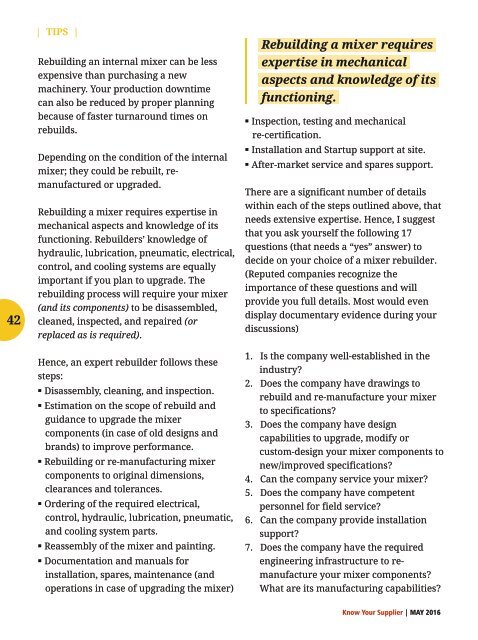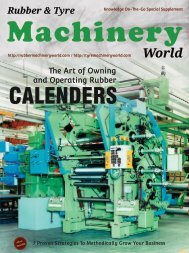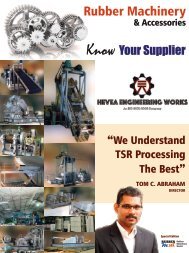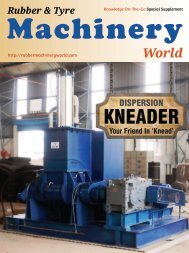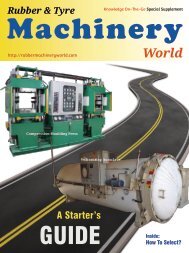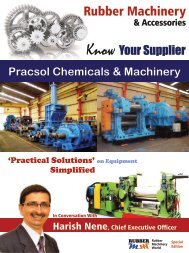Know Your Supplier - Rubber & Tyre Machinery World May 2016 Special
Sustaining & innovating amidst changes is the hallmark of exemplary leadership. Pelmar Group has been displaying this leadership for the last 50 years! In this special edition, we showcase for you Pelmar Eng Ltd and two other knowledge enhancing articles
Sustaining & innovating amidst changes is the hallmark of exemplary leadership. Pelmar Group has been displaying this leadership for the last 50 years! In this special edition, we showcase for you Pelmar Eng Ltd and two other knowledge enhancing articles
You also want an ePaper? Increase the reach of your titles
YUMPU automatically turns print PDFs into web optimized ePapers that Google loves.
42<br />
| TIPS |<br />
Rebuilding an internal mixer can be less<br />
expensive than purchasing a new<br />
machinery. <strong>Your</strong> production downtime<br />
can also be reduced by proper planning<br />
because of faster turnaround times on<br />
rebuilds.<br />
Depending on the condition of the internal<br />
mixer; they could be rebuilt, remanufactured<br />
or upgraded.<br />
Rebuilding a mixer requires expertise in<br />
mechanical aspects and knowledge of its<br />
functioning. Rebuilders’ knowledge of<br />
hydraulic, lubrication, pneumatic, electrical,<br />
control, and cooling systems are equally<br />
important if you plan to upgrade. The<br />
rebuilding process will require your mixer<br />
(and its components) to be disassembled,<br />
cleaned, inspected, and repaired (or<br />
replaced as is required).<br />
Hence, an expert rebuilder follows these<br />
steps:<br />
▪ Disassembly, cleaning, and inspection.<br />
▪ Estimation on the scope of rebuild and<br />
guidance to upgrade the mixer<br />
components (in case of old designs and<br />
brands) to improve performance.<br />
▪ Rebuilding or re-manufacturing mixer<br />
components to original dimensions,<br />
clearances and tolerances.<br />
▪ Ordering of the required electrical,<br />
control, hydraulic, lubrication, pneumatic,<br />
and cooling system parts.<br />
▪ Reassembly of the mixer and painting.<br />
▪ Documentation and manuals for<br />
installation, spares, maintenance (and<br />
operations in case of upgrading the mixer)<br />
Rebuilding a mixer requires<br />
expertise in mechanical<br />
aspects and knowledge of its<br />
functioning.<br />
▪ Inspection, testing and mechanical<br />
re-certification.<br />
▪ Installation and Startup support at site.<br />
▪ After-market service and spares support.<br />
There are a significant number of details<br />
within each of the steps outlined above, that<br />
needs extensive expertise. Hence, I suggest<br />
that you ask yourself the following 17<br />
questions (that needs a “yes” answer) to<br />
decide on your choice of a mixer rebuilder.<br />
(Reputed companies recognize the<br />
importance of these questions and will<br />
provide you full details. Most would even<br />
display documentary evidence during your<br />
discussions)<br />
1. Is the company well-established in the<br />
industry?<br />
2. Does the company have drawings to<br />
rebuild and re-manufacture your mixer<br />
to specifications?<br />
3. Does the company have design<br />
capabilities to upgrade, modify or<br />
custom-design your mixer components to<br />
new/improved specifications?<br />
4. Can the company service your mixer?<br />
5. Does the company have competent<br />
personnel for field service?<br />
6. Can the company provide installation<br />
support?<br />
7. Does the company have the required<br />
engineering infrastructure to remanufacture<br />
your mixer components?<br />
What are its manufacturing capabilities?<br />
<strong>Know</strong> <strong>Your</strong> <strong>Supplier</strong> | MAY <strong>2016</strong>


